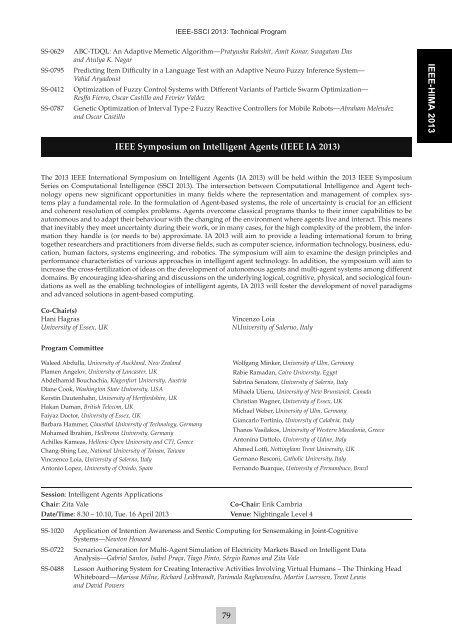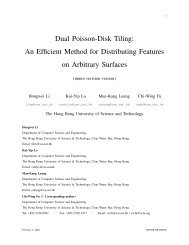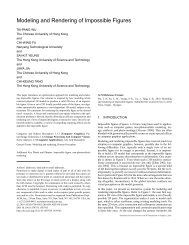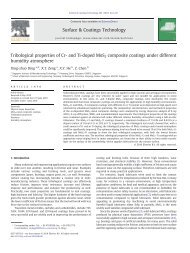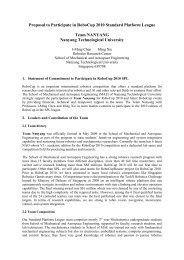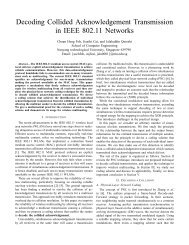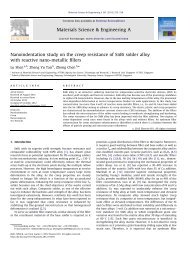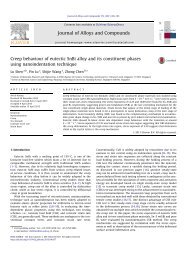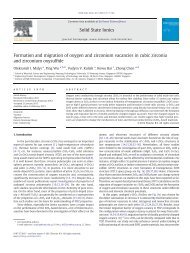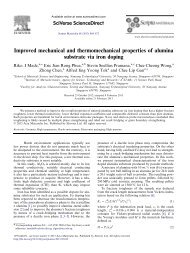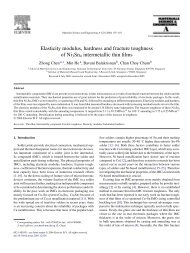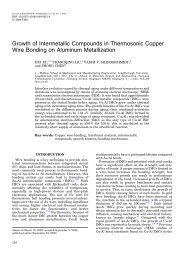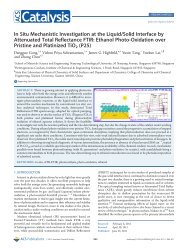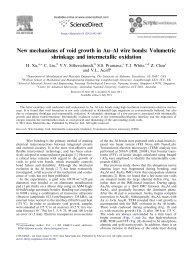Prog-Book_forweb - Nanyang Technological University
Prog-Book_forweb - Nanyang Technological University
Prog-Book_forweb - Nanyang Technological University
You also want an ePaper? Increase the reach of your titles
YUMPU automatically turns print PDFs into web optimized ePapers that Google loves.
IEEE-SSCI 2013: Technical <strong>Prog</strong>ram<br />
SS-0629 ABC-TDQL: An Adaptive Memetic Algorithm—Pratyusha Rakshit, Amit Konar, Swagatam Das<br />
and Atulya K. Nagar<br />
SS-0795 Predicting Item Difficulty in a Language Test with an Adaptive Neuro Fuzzy Inference System—<br />
Vahid Aryadoust<br />
SS-0412 Optimization of Fuzzy Control Systems with Different Variants of Particle Swarm Optimization—<br />
Resffa Fierro, Oscar Castillo and Fevrier Valdez<br />
SS-0787 Genetic Optimization of Interval Type-2 Fuzzy Reactive Controllers for Mobile Robots—Abraham Melendez<br />
and Oscar Castillo<br />
IEEE Symposium on Intelligent Agents (IEEE IA 2013)<br />
The 2013 IEEE International Symposium on Intelligent Agents (IA 2013) will be held within the 2013 IEEE Symposium<br />
Series on Computational Intelligence (SSCI 2013). The intersection between Computational Intelligence and Agent technology<br />
opens new significant opportunities in many fields where the representation and management of complex systems<br />
play a fundamental role. In the formulation of Agent-based systems, the role of uncertainty is crucial for an efficient<br />
and coherent resolution of complex problems. Agents overcome classical programs thanks to their inner capabilities to be<br />
autonomous and to adapt their behaviour with the changing of the environment where agents live and interact. This means<br />
that inevitably they meet uncertainty during their work, or in many cases, for the high complexity of the problem, the information<br />
they handle is (or needs to be) approximate. IA 2013 will aim to provide a leading international forum to bring<br />
together researchers and practitioners from diverse fields, such as computer science, information technology, business, education,<br />
human factors, systems engineering, and robotics. The symposium will aim to examine the design principles and<br />
performance characteristics of various approaches in intelligent agent technology. In addition, the symposium will aim to<br />
increase the cross-fertilization of ideas on the development of autonomous agents and multi-agent systems among different<br />
domains. By encouraging idea-sharing and discussions on the underlying logical, cognitive, physical, and sociological foundations<br />
as well as the enabling technologies of intelligent agents, IA 2013 will foster the development of novel paradigms<br />
and advanced solutions in agent-based computing.<br />
Co-Chair(s)<br />
Hani Hagras<br />
<strong>University</strong> of Essex, UK<br />
<strong>Prog</strong>ram Committee<br />
Waleed Abdulla, <strong>University</strong> of Auckland, New Zealand<br />
Plamen Angelov, <strong>University</strong> of Lancaster, UK<br />
Abdelhamid Bouchachia, Klagenfurt <strong>University</strong>, Austria<br />
Diane Cook, Washington State <strong>University</strong>, USA<br />
Kerstin Dautenhahn, <strong>University</strong> of Hertfordshire, UK<br />
Hakan Duman, British Telecom, UK<br />
Faiyaz Doctor, <strong>University</strong> of Essex, UK<br />
Barbara Hammer, Clausthal <strong>University</strong> of Technology, Germany<br />
Mohamed Ibrahim, Heilbronn <strong>University</strong>, Germany<br />
Achilles Kameas, Hellenic Open <strong>University</strong> and CTI, Greece<br />
Chang-Shing Lee, National <strong>University</strong> of Tainan, Taiwan<br />
Vinczenco Loia, <strong>University</strong> of Salerno, Italy<br />
Antonio Lopez, <strong>University</strong> of Oviedo, Spain<br />
Vincenzo Loia<br />
N<strong>University</strong> of Salerno, Italy<br />
Wolfgang Minker, <strong>University</strong> of Ulm, Germany<br />
Rabie Ramadan, Cairo <strong>University</strong>, Egypt<br />
Sabrina Senatore, <strong>University</strong> of Salerno, Italy<br />
Mihaela Ulieru, <strong>University</strong> of New Brunswick, Canada<br />
Christian Wagner, <strong>University</strong> of Essex, UK<br />
Michael Weber, <strong>University</strong> of Ulm, Germany<br />
Giancarlo Fortinio, <strong>University</strong> of Calabria, Italy<br />
Thanos Vasilakos, <strong>University</strong> of Western Macedonia, Greece<br />
Antonina Dattolo, <strong>University</strong> of Udine, Italy<br />
Ahmed Lotfi, Nottingham Trent <strong>University</strong>, UK<br />
Germano Resconi, Catholic <strong>University</strong>, Italy<br />
Fernando Buarque, <strong>University</strong> of Pernambuco, Brazil<br />
Session: Intelligent Agents Applications<br />
Chair: Zita Vale Co-Chair: Erik Cambria<br />
Date/Time: 8.30 – 10.10, Tue. 16 April 2013 Venue: Nightingale Level 4<br />
SS-1020 Application of Intention Awareness and Sentic Computing for Sensemaking in Joint-Cognitive<br />
Systems—Newton Howard<br />
SS-0722 Scenarios Generation for Multi-Agent Simulation of Electricity Markets Based on Intelligent Data<br />
Analysis—Gabriel Santos, Isabel Praça, Tiago Pinto, Sérgio Ramos and Zita Vale<br />
SS-0488 Lesson Authoring System for Creating Interactive Activities Involving Virtual Humans – The Thinking Head<br />
Whiteboard—Marissa Milne, Richard Leibbrandt, Parimala Raghavendra, Martin Luerssen, Trent Lewis<br />
and David Powers<br />
79<br />
IEEE-HIMA 2013


